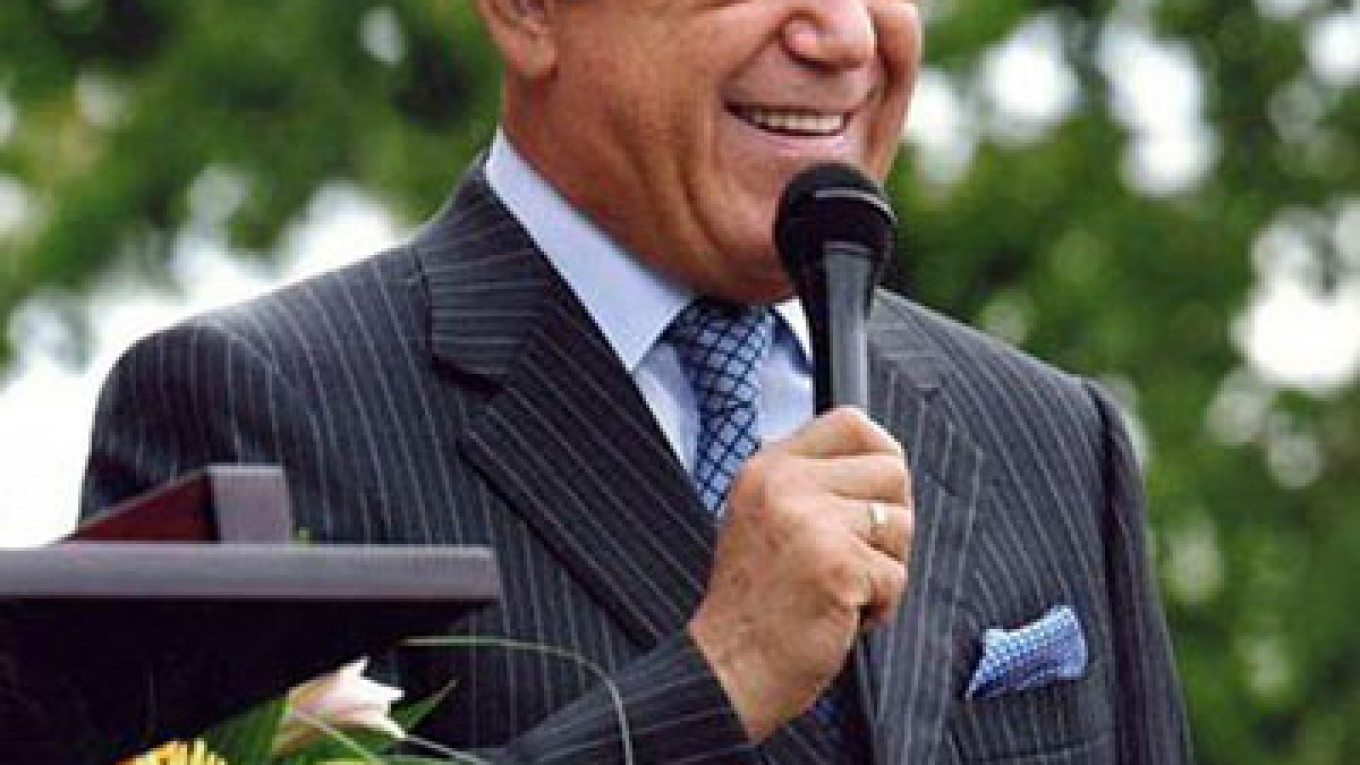With his famous toupee, fabulous eyebrow pencil and thundering voice, Russian singer Iosif Kobzon is an unlikely poster child for the debate on justice vs. mercy. Yet sanctions and an illness have had this unlikely effect.
Kobzon has been a fixture on the Russian music scene since Soviet years. His fame propelled him to the Russian State Duma years ago, where he has dutifully voted for all manner of controversial legislature, including Russia's ban on adoptions by American parents. Several deaths of ill orphans were blamed on the ban after it was implemented, but both the Kremlin and the Duma, including Kobzon, were unmoved.
The singer is known for his support of Russia's annexation of Crimea. He was placed on a U.S. travel ban for alleged connections to organized crime years ago, and was barred from entering the EU earlier this year as the result of sanctions over the Ukraine conflict. Kobzon also has cancer. He had surgery in Germany several years ago.
Last week, the singer said that he might appeal to Russian President Vladimir Putin for help should he need to seek treatment in a country that sanctioned him. He later clarified his comments, telling a radio station that it was the president himself who suggested aiding him — but the damage was already done. Kobzon's statement prompted outrage from the Russian intelligentsia, and an embarrassed silence from the elite. Deaths of Russian orphans who were denied homes abroad were, understandably, brought up again and again as people debated whether not Kobzon should be allowed to go abroad. How dare this privileged man seek the sort of help he has explicitly denied to others, people asked.
Others argued that Kobzon is a complicated figure. They reminded critics of the singer's role in helping free terror hostages years ago, as well as his trip to perform for rescuers at Chernobyl in 1986.
I myself recalled how Kobzon was probably the only famous person who stood by Moscow's ex-mayor Yury Luzhkov when the latter was fired. I'm not a Luzhkov fangirl, but there was something touching about Kobzon's refusal to turn his back on a friend who was out of favor.
None of that matters as society debates what Kobzon "deserves," because mercy isn't something that can be "deserved" in the first place.
Kobzon's medical debacle illustrates the bind that the Russian elite is now in. Proud patriots on the surface, these people are used to receiving medical aid in the "evil West," as well as going to the "evil West" for shopping trips and vacations. Travel bans have resulted in a rude — and, let's face it — just awakening.
Yet if Russian society wants to move on from the atmosphere of hatred and suspicion that has engulfed it due to the Ukraine crisis, it should be merciful to people like Kobzon. Woland, the devil figure in Mikhail Bulgakov's "The Master and Margarita," famously complained that mercy "unexpectedly and deviously gets inside through the narrowest cracks." In Woland's view — and in my view — mercy cannot be earned. It is irrational, angelic (and hence annoying to the devil). Mercy is not about redemption — not for its object, anyway. And mercy asks for nothing in return.
In the coming years, Russian society would do well to remember Woland's lesson. Among witch hunts and repressive laws, a troubled economy and no clear path going forward (I refuse to believe that Russia's uneasy new friendship with China after a falling out with the West represents a clear path), there need to be people willing to show mercy toward their most hated political opponents. It is the only way for Russia's society to begin healing itself.
Would-be reformers must remember that becoming a monster for the sake of beating a monster never works out well. And yes, this means that glee over Kobzon's predicament is ultimately destructive.
Natalia Antonova is an American playwright and journalist.
A Message from The Moscow Times:
Dear readers,
We are facing unprecedented challenges. Russia's Prosecutor General's Office has designated The Moscow Times as an "undesirable" organization, criminalizing our work and putting our staff at risk of prosecution. This follows our earlier unjust labeling as a "foreign agent."
These actions are direct attempts to silence independent journalism in Russia. The authorities claim our work "discredits the decisions of the Russian leadership." We see things differently: we strive to provide accurate, unbiased reporting on Russia.
We, the journalists of The Moscow Times, refuse to be silenced. But to continue our work, we need your help.
Your support, no matter how small, makes a world of difference. If you can, please support us monthly starting from just $2. It's quick to set up, and every contribution makes a significant impact.
By supporting The Moscow Times, you're defending open, independent journalism in the face of repression. Thank you for standing with us.
Remind me later.








